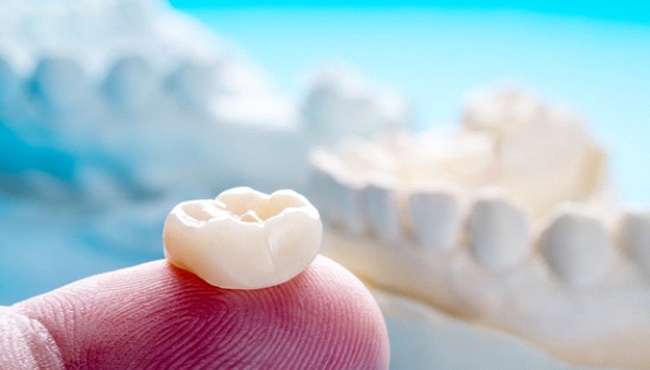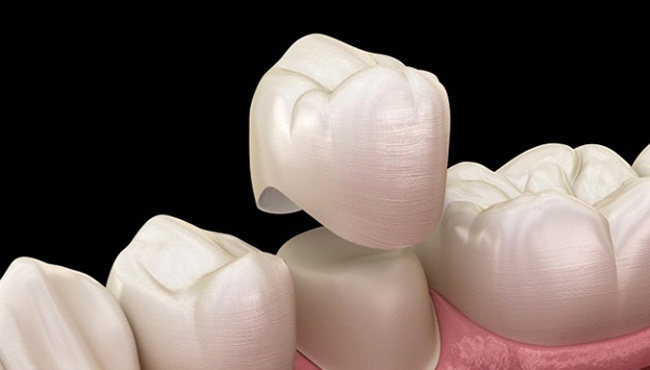Dental Crowns – Fort Worth, TX
Lifelike Repair for Damaged Teeth

Teeth are incredibly durable. In fact, tooth enamel is even stronger than bone! However, teeth can still become damaged over the years for a variety of reasons. Many patients worry that getting treatment for a chipped, cracked, or otherwise broken tooth will ruin the natural appearance of their smiles. In the past, dental restorations like crowns were typically made of gold or silver, but luckily, that’s no longer the case! Nowadays, most dentists – including Dr. Terry Drennan – use metal-free materials to create dental crowns in Fort Worth, TX. Keep reading below to learn more, and feel free to call us when you’re ready to experience truly lifelike repair for damaged teeth!
Why Choose Drennan Family Dentistry for Dental Crowns?
- Fort Worth Dentist with 40+ Years of Experience
- High-Quality Materials Used
- Digital Impression System – No Messy Putty Required!
What Is a Dental Crown?

Also sometimes referred to as a “cap,” a dental crown is a covering that is placed over a damaged, decayed, or aesthetically flawed tooth to restore its original structure, function, and appearance. Depending on your preference, oral health needs, and budget, crowns can be crafted from a variety of materials. However, most of our patients prefer tooth-colored ceramic or porcelain to dark metals that stand out in the smile.
Dental crowns are quite a versatile treatment. Dr. Drennan typically suggests a crown for a tooth that:
- Is too decayed to support a filling.
- Is broken and needs to be held together.
- Has recently undergone root canal therapy.
- Is weakened and needs protection from further damage.
- Has been lost and replaced with a single dental implant.
- Needs to support a dental bridge.
- Is severely discolored, misshapen, or otherwise cosmetically flawed.
Whatever the case may be, your dentist in Fort Worth will go over all of your treatment options to make sure that dental crowns are the best choice for you.
The Process of Getting a Dental Crown

In most cases, getting a dental crown only takes two appointments. Here’s a general outline of the dental crown process:
- First, our team prepares the tooth by gently reshaping its enamel. This step ensures that there is enough room for the crown to look and feel natural within your smile.
- We use our digital impression technology to capture measurements of your mouth, which we then send to a dental lab. There, a team of experienced ceramists begin meticulously creating your crown.
- To protect your tooth while the crown is being made, we place a temporary crown on top of it.
- You return to our office in a few weeks when the permanent crown arrives from the lab. We make sure your bite looks good and cement the crown to your tooth.
Benefits of Dental Crowns

By getting a dental crown, you can enjoy several benefits to your smile’s health and appearance, including:
- Easier chewing.
- Protection from additional damage that might result in the need for a tooth extraction.
- A customized solution that mimics the rest of your smile.
- Lifespan of 15+ years with the right care and maintenance.
Dental Crown FAQs
Are dental crowns permanent?
A dental crown is designed to serve as a long-term solution; however, it isn’t permanent. Eventually, your restoration will need to be replaced. Since the application process requires your tooth to be reshaped, it must always be covered to safeguard it from preventable damage, like fractures. Various factors affect the lifespan of crowns, but Dr. Drennan will explain how to get the most out of your investment, like brushing and flossing.
How long do dental crowns last?
The average crown will last for 5 to 10 years before needing to be replaced; however, it can last for a decade or longer with the right aftercare. Several factors influence the lifespan of a restoration, like the materials used to make it. The location of the crown can also affect its life expectancy. The back teeth undergo more pressure from biting and chewing. Crowns placed on molars have slightly shorter lifespans than those used on front teeth. You can ensure your restoration lasts for years with a solid oral hygiene routine at home and regular care from your dentist in Fort Worth. It’s best to break any bad oral habits, like using your teeth to open bottles or chewing on ice. Dr. Drennan will recommend limiting hard and sticky foods to avoid damaging your crown. Let Dr. Drennan know if you have a habit of grinding or clenching your teeth. A nightguard will provide a protective barrier between your upper and lower arches to safeguard your crown.
Can dental crowns get cavities?
A dental crown isn’t vulnerable to decay, but don’t stop brushing and flossing. Your underlying tooth can still get cavities, despite being covered by the restoration. Plaque buildup where the crown meets the gum line can allow bacteria to gain access to your tooth. Not to mention, cracks can form in the bonding material over time, allowing bacteria to reach your tooth. Brushing, flossing, and routine dental care can promote a cavity-free smile. Besides a commitment to your oral hygiene, limit your sugar consumption.
Are dental crowns covered by insurance?
Crowns are often covered by dental insurance when medically necessary. Every policy differs, but most can pay 50% to 80% of the cost after reaching your deductible. Your insurance can also cover certain steps in your treatment plan, like the consultation or imaging. We will work on your behalf with your dental insurance to maximize your annual benefits. A member of our team will explain how your coverage is being used and if you owe any remaining balance. Our office accepts several payment methods for any out-of-pocket expenses, including third-party financing. We will help you find the solutions you need to repair your smile without spending your life’s savings.






